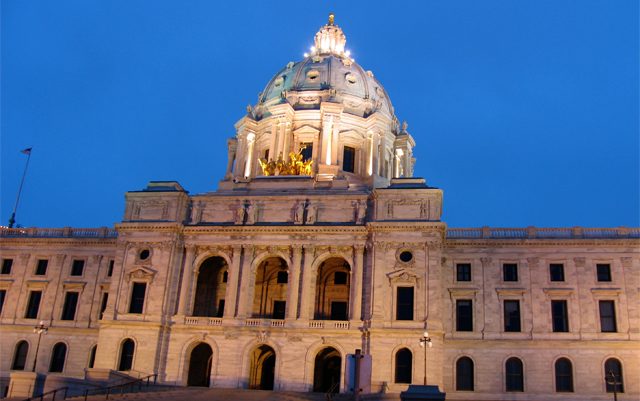There seems to be no end to the number of states with at least a handful of lawmakers who are looking to move on cannabis reform. They each have their own reasons, but many are the same: prohibition is costly, causes more harm than it does good and provides the black market with an endless revenue stream. Instead, they would like to see marijuana move to a legal, taxed and regulated market similar to the alcohol industry, where the money can then be put towards growing businesses, increasing job opportunities, funding schools and much more.
In Minnesota, at least two lawmakers have already made their move for 2017 – introducing separate bills that would legalize, tax and regulate marijuana, effectively ending prohibition at a statewide level. However, even though the bills have been introduced, there is not much hope that there is enough support in the Republican dominant state for either to gain enough traction this session to pass – but at least they’re giving it a shot, even if it only manages to open up the conversation for the future.
“Ultimately, I envision a billion dollar ‘Made in Minnesota’ marijuana economy, where the products are grown by Minnesota farmers, distributed by Minnesota companies, and sold by Minnesota small business owners,” Rep. Applebaum said in a statement. “Ideally, all tax proceeds would be directed towards funding Minnesota’s public schools and would result in lower taxes for Minnesota families.”
The bill introduced by Representative Jon Applebaum looks to directly legalize marijuana possession and use for adults 21 and older. It would also give them the means to create licensing procedures for cultivation and processing facilities and retail dispensaries. What it does not appear to do, however, is give adults the right to grow their own cannabis at home. Taxes collected from the commercial sales would likely fund schools first – which is something that many states have included in their cannabis legalization laws.
Now the second bill is a little different. Instead of giving the opportunity to make this decision to lawmakers alone, it would give the state’s voters a chance to add legalization to the state constitution in the form of an amendment. The overall idea of the bill is the same as the first, which is to make cannabis legal for adults 21 and over and create a regulated and taxed system for commercial growth and sales. Under this bill, however, the tax revenue from sales would go to chemical dependency treatment and mental health education and treatment.
“Minnesotans know that the prohibition on cannabis is costly, harmful and antiquated,” Liebling said in a statement. “Estimates of the cost of cannabis enforcement in Minnesota range from $42 million a year for possession offenses alone to $137 million a year for all cannabis arrests. Yet Minnesotans spend perhaps $700 million a year on cannabis, indirectly helping fund crime through an enormous black market. All this for a substance that – while not harmless – is far safer than alcohol. My bill would let citizens decide whether it is time to try a different path- one already successfully paved by many other states.”
Even though there is a very slim chance of either of these bills making it very far this year, at least those who believe this is the right way to go are making the effort. Perhaps it will persuade some of the other legislators in the state to at least consider things from an alternative point of view. After all, the majority of Americans don’t think cannabis should be illegal. For the time being, these bills are a huge step forward for Minnesota; the next big step is for them to convince enough of their peers that this is the right thing to do for their state.






